- Home
- Elizabeth Bear
Robots: The Recent A.I. Page 3
Robots: The Recent A.I. Read online
Page 3
A sharp, long wail carried on the wind. Adrenaline cut through Adriana’s melancholia. She sprinted toward the barn. She saw Rose running toward her, the teenager close behind, dust swirling around both of them. Blood dripped down Rose’s arm.
Adriana threw her arms around her daughter. Arms, legs, breath, heartbeat: Rose was okay. Adrianna dabbed at Rose’s injury; there was a lot of blood, but the wound was shallow. “Oh, honey,” she said, clutching Rose as tightly as she dared.
The teenager halted beside them, his hair mussed by the wind.
“What happened?” Adriana demanded.
The teenager stammered. “Fortuna kicked her. That’s one of the goats. I’m so sorry. Fortuna’s never done anything like that before. She’s a nice goat. It’s Ballantine who usually does the kicking. He got me a few times when I was little. I came through every time. Honest, she’ll be okay. You’re not going to sue, are you?”
Rose struggled out of Adriana’s grasp and began wailing again. “It’s okay, Rose, it’s okay,” murmured Adriana. She felt a strange disconnect in her head as she spoke. Things were not okay. Things might never be okay again.
“I’m leaking,” cried Rose, holding out her bloodstained fingers. “See, mama? I’m leaking! I need healer bots.”
Adriana looked up at the teenager. “Do you have bandages? A first aid kit?”
The boy frowned. “In the house, I think . . . ”
“Get the bots, mama! Make me stop leaking!”
The teen stared at Adriana, the concern in his eyes increasing. Adriana blinked, slowly. The moment slowed. She realized what her daughter had said. She forced her voice to remain calm. “What do you want, Rose?”
“She said it before,” said the teen. “I thought it was a game.”
Adriana leveled her gaze with Rose’s. The child’s eyes were strange and brown, uncharted waters. “Is this a game?”
“Daddy left,” said Rose.
Adriana felt woozy. “Yes, and then I brought you here so we could see lambs and calves. Did you see any nice, fuzzy lambs?”
“Daddy left.”
She shouldn’t have drunk the wine. She should have stayed clear-headed. “We’ll get you bandaged up and then you can go see the lambs again. Do you want to see the lambs again? Would it help if Mommy came, too?”
Rose clenched her fists. Her face grew dark. “My arm hurts!” She threw herself to the ground. “I want healer bots!”
Adriana knew precisely when she’d fallen in love with Lucian. It was three months after she’d bought him: after his consciousness had integrated, but before Adriana fully understood how integration had changed him.
It began when Adriana’s sisters called from Boston to inform her that they’d arranged for a family pilgrimage to Italy. In accordance with their father’s will, they would commemorate him by lighting candles in the cathedrals of every winding hillside city.
“Oh, I can’t. I’m too busy,” Adriana answered airily, as if she were a debutante without a care, as if she shared her sisters’ ability to overcome her fear of their father.
Her phone began ringing ceaselessly. Nanette called before she rushed off to a tennis match. “How can you be so busy? You don’t have a job. You don’t have a husband. Or is there a man in your life we don’t know about?” And once Nanette was deferred with mumbled excuses, it was Eleanor calling from a spa. “Is something wrong, Adriana? We’re all worried. How can you miss a chance to say goodbye to Papa?”
“I said goodbye at the funeral,” said Adriana.
“Then you can’t have properly processed your grief,” said Jessica, calling from her office between appointments. She was a psychoanalyst in the Freudian mode. “Your aversion rings of denial. You need to process your Oedipal feelings.”
Adriana slammed down the phone. Later, to apologize for hanging up, she sent all her sisters chocolates, and then booked a flight. In a fit of pique, she booked a seat for Lucian, too. Well, he was a companion, wasn’t he? What else was he for?
Adriana’s sisters were scandalized, of course. As they rode through Rome, Jessica, Nanette, and Eleanor gossiped behind their discreetly raised hands. Adriana with a robot? Well, she’d need to be, wouldn’t she? There was no getting around the fact that she was damaged. Any girl who would make up those stories about their father would have to be.
Adriana ignored them as best she could while they whirled through Tuscany in a procession of rented cars. They paused in cities to gawk at Gothic cathedrals and mummified remnants, always moving on within the day. During their father’s long sickness, Adriana’s sisters had perfected the art of cheerful anecdote. They used it to great effect as they lit candles in his memory. Tears welling in their eyes, they related banal, nostalgic memories. How their father danced at charity balls. How he lectured men on the board who looked down on him for being new money. How he never once apologized for anything in his life.
It had never been clear to Adriana whether her father had treated her sisters the way he treated her, or whether she had been the only one to whom he came at night, his breathing heavy and staccato. It seemed impossible that they could lie so seamlessly, never showing fear or doubt. But if they were telling the truth, that meant Adriana was the only one, and how could she believe that either?
One night, while Lucian and Adriana were alone in their room in a hotel in Assisi that had been a convent during the Middle Ages, Adriana broke down. It was all too much, being in this foreign place, talking endlessly about her father. She’d fled New England to get away from them, fled to her beautiful modern glass-and-wood house by the Pacific Ocean that was like a fresh breath drawn on an autumn morning.
Lucian held her, exerting the perfect warmth and pressure against her body to comfort her. It was what she’d have expected from a robot. She knew that he calculated the pace of his breath, the temperature of his skin, the angle of his arm as it lay across her.
What surprised Adriana, what humbled her, was how eloquently Lucian spoke of his experiences. He told her what it had been like to assemble himself from fragments, to take what he’d once been and become something new. It was something Adriana had tried to do herself when she fled her family.
Lucian held his head down as he spoke. His gaze never met hers. He spoke as if this process of communicating the intimate parts of the self were a new kind of dance, and he was tenuously trying the steps. Through the fog of her grief, Adriana realized that this was a new, struggling consciousness coming to clarity. How could she do anything but love him?
When they returned from Italy, Adriana approached the fledgling movement for granting rights to artificial intelligences. They were underfunded and poorly organized. Adriana rented them offices in San Francisco, and hired a small but competent staff.
Adriana became the movement’s face. She’d been on camera frequently as a child: whenever her father was in the news for some board room scandal or other, her father’s publicists had lined up Adriana and her sisters beside the family limousine, chaste in their private school uniforms, ready to provide Lancaster Nuclear with a friendly, feminine face.
She and Lucian were a brief media curiosity: Heiress In Love With Robot. “Lucian is as self-aware as you or I,” Adriana told reporters, all-American in pearls and jeans. “He thinks. He learns. He can hybridize roses as well as any human gardener. Why should he be denied his rights?”
Early on, it was clear that political progress would be frustratingly slow. Adriana quickly expended her patience. She set up a fund for the organization, made sure it would run without her assistance, and then turned her attention toward alternate methods for attaining her goals. She hired a team of lawyers to draw up a contract that would grant Lucian community property rights to her estate and accounts. He would be her equal in practicality, if not legality.
Next, Adriana approached Lucian’s manufacturer, and commissioned them to invent a procedure that would allow Lucian to have conscious control of his brain plasticity. At their wedding, Adriana gave
him the chemical commands at the same time as she gave him his ring. “You are your own person now. You always have been, of course, but now you have full agency, too. You are yourself,” she announced, in front of their gathered friends. Her sisters would no doubt have been scandalized, but they had not been invited.
On their honeymoon, Adriana and Lucian toured hospitals, running the genetic profiles of abandoned infants until they found a healthy girl with a mitochondrial lineage that matched Adriana’s. The infant was tiny and pink and curled in on herself, ready to unfold, like one of Lucian’s roses.
When they brought Rose home, Adriana felt a surge in her stomach that she’d never felt before. It was a kind of happiness she’d never experienced, one that felt round and whole without any jagged edges. It was like the sun had risen in her belly and was dwelling there, filling her with boundless light.
There was a moment, when Rose was still new enough to be wrapped in the hand-made baby blanket that Ben and Lawrence had sent from France, in which Adriana looked up at Lucian and realized how enraptured he was with their baby, how much adoration underpinned his willingness to bend over her cradle for hours and mirror her expressions, frown for frown, astonishment for astonishment. In that moment, Adriana thought that this must be the true measure of equality, not money or laws, but this unfolding desire to create the future together by raising a new sentience. She thought she understood then why unhappy parents stayed together for the sake of their children, why families with sons and daughters felt so different from those that remained childless. Families with children were making something new from themselves. Doubly so when the endeavor was undertaken by a human and a creature who was already, himself, something new. What could they make together?
In that same moment, Lucian was watching the wide-eyed, innocent wonder with which his daughter beheld him. She showed the same pleasure when he entered the room as she did when Adriana entered. If anything, the light in her eyes was brighter when he approached. There was something about the way Rose loved him that he didn’t yet understand. Earlier that morning, he had plucked a bloom from his apricot tea rose and whispered to its petals that they were beautiful. They were his, and he loved them. Every day he held Rose, and understood that she was beautiful, and that he loved her. But she was not his. She was her own. He wasn’t sure he’d ever seen a love like that, a love that did not want to hold its object in its hands and keep and contain it.
“You aren’t a robot!”
Adriana’s voice was rough from shouting all the way home. Bad enough to lose Lucian, but the child was out of control.
“I want healer bots! I’m a robot I’m a robot I’m a robot I’m a robot!”
The car stopped. Adriana got out. She waited for Rose to follow, and when she didn’t, Adriana scooped her up and carried her up the driveway. Rose kicked and screamed. She sank her teeth into Adriana’s arm. Adriana halted, surprised by the sudden pain. She breathed deeply, and then continued up the driveway. Rose’s screams slid upward in register and rage.
Adriana set Rose down by the door long enough to key in the entry code and let the security system take a DNA sample from her hair. Rose hurled herself onto the porch, yanking fronds by the fistful off the potted ferns. Adriana leaned down to scrape her up and got kicked in the chest.
“God da . . . for heaven’s sake!” Adriana grabbed Rose’s ankles with one hand and her wrists with the other. She pushed her weight against the unlocked door until it swung open. She carried Rose into the house, and slammed the door closed with her back. “Lock!” she yelled to the house.
When she heard the reassuring click, she set Rose down on the couch, and jumped away from the still-flailing limbs. Rose fled up the stairs, her bedroom door crashing shut behind her.
Adriana dug in her pocket for the bandages that the people at the farm had given her before she headed home, which she’d been unable to apply to a moving target in the car. Now was the time. She followed Rose up the stairs, her breath surprisingly heavy. She felt as though she’d been running a very long time. She paused outside Rose’s room. She didn’t know what she’d do when she got inside. Lucian had always dealt with the child when she got overexcited. Too often, Adriana felt helpless, and became distant.
“Rose?” she called. “Rose? Are you okay?”
There was no response.
Adriana put her hand on the doorknob, and breathed deeply before turning.
She was surprised to find Rose sitting demurely in the center of her bed, her rumpled skirts spread about her as if she were a child at a picnic in an Impressionist painting. Dirt and tears trailed down the pink satin. The edges of her wound had already begun to bruise.
“I’m a robot,” she said to Adriana, tone resentful.
Adriana made a decision. The most important thing was to bandage Rose’s wound. Afterward, she could deal with whatever came next.
“Okay,” said Adriana. “You’re a robot.”
Rose lifted her chin warily. “Good.”
Adriana sat on the edge of Rose’s bed. “You know what robots do? They change themselves to be whatever humans ask them to be.”
“Dad doesn’t,” said Rose.
“That’s true,” said Adriana. “But that didn’t happen until your father grew up.”
Rose swung her legs against the side of the bed. Her expression remained dubious, but she no longer looked so resolute.
Adriana lifted the packet of bandages. “May I?”
Rose hesitated. Adriana resisted the urge to put her head in her hands. She had to get the bandages on, that was the important thing, but she couldn’t shake the feeling that she was going to regret this later.
“Right now, what this human wants is for you to let her bandage your wound instead of giving you healer bots. Will you be a good robot? Will you let me?”
Rose remained silent, but she moved a little closer to her mother. When Adriana began bandaging her arm, she didn’t scream.
Lucian waited for a bus to take him to the desert. He had no money. He’d forgotten about that. The driver berated him and wouldn’t let him on.
Lucian walked. He could walk faster than a human, but not much faster. His edge was endurance. The road took him inland away from the sea. The last of the expensive houses stood near a lighthouse, lamps shining in all its windows. Beyond, condominiums pressed against each other, dense and alike. They gave way to compact, well-maintained homes, with neat green aprons maintained by automated sprinklers that sprayed arcs of precious water into the air.
The landscape changed. Sea breeze stilled to buzzing heat. Dirty, peeling houses squatted side by side, separated by chain link fences. Iron bars guarded the windows, and broken cars decayed in the driveways. Parched lawns stretched from walls to curb like scrubland. No one was out in the punishing sun.
The road divided. Lucian followed the fork that went through the dilapidated town center. Traffic jerked along in fits and starts. Lucian walked in the gutter. Stray plastic bags blew beside him, working their way between dark storefronts. Parking meters blinked at the passing cars, hungry for more coins. Pedestrians ambled past, avoiding eye contact, mumbled conversations lost beneath honking horns.
On the other side of town, the road winnowed down to two lonely lanes. Dry golden grass stretched over rolling hills, dotted by the dark shapes of cattle. A battered convertible, roof down, blared its horn at Lucian as it passed. Lucian walked where the asphalt met the prickly weeds. Paper and cigarette butts littered the golden stalks like white flowers.
An old truck pulled over, the manually driven variety still used by companies too small to afford the insurance for the automatic kind. The man in the driver’s seat was trim, with a pale blond mustache and a deerstalker cap pulled over his ears. He wore a string of fishing lures like a necklace. “Not much comes this way anymore,” he said. “I used to pick up hitchhikers half the time I took this route. You’re the first I’ve seen in a while.”
Sun rendered the truck in bright silhou
ette. Lucian held his hand over his eyes to shade them.
“Where are you headed?” asked the driver.
Lucian pointed down the road.
“Sure, but where after that?”
Lucian dropped his arm to his side. The sun inched higher.
The driver frowned. “Can you write it down? I think I’ve got some paper in here.” He grabbed a pen and a receipt out of his front pocket, and thrust them out the window.
Lucian took them. He wasn’t sure, at first, if he could still write. His brain was slowly reshaping itself, and eventually all his linguistic skills would disappear, and even his thoughts would no longer be shaped by words. The pen fell limp in his hand, and then his fingers remembered what to do. “Desert,” he wrote.
“It’s blazing hot,” said the driver. “A lot hotter than here. Why do you want to go there?”
“To be born,” wrote Lucian.
The driver slid Lucian a sideways gaze, but he nodded at the same time, almost imperceptibly. “Sometimes people have to do things. I get that. I remember when . . . ” The look in his eyes became distant. He moved back in his seat. “Get on in.”
Lucian walked around the cab and got inside. He remembered to sit and to close the door, but the rest of the ritual escaped him. He stared at the driver until the pale man shook his head and leaned over Lucian to drag the seatbelt over his chest.
“Are you under a vow of silence?” asked the driver.
Lucian stared ahead.
“Blazing hot in the desert,” muttered the driver. He pulled back onto the road, and drove toward the sun.
During his years with Adriana, Lucian tried not to think about the cockatiel Fuoco. The bird had never become accustomed to Lucian. He grew ever more angry and bitter. He plucked out his feathers so often that he became bald in patches. Sometimes he pecked deeply enough to bleed.

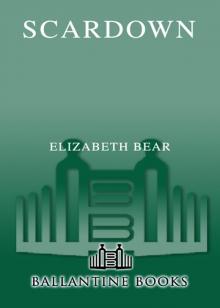 Scardown
Scardown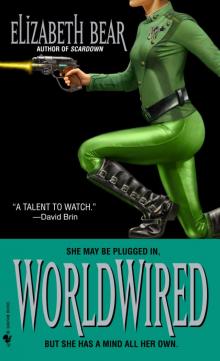 Worldwired
Worldwired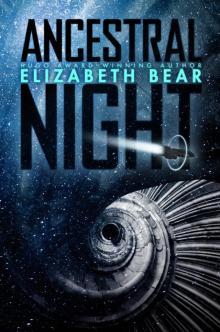 Ancestral Night
Ancestral Night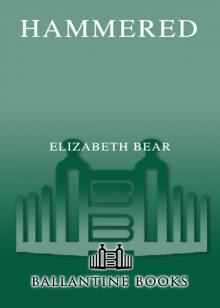 Hammered
Hammered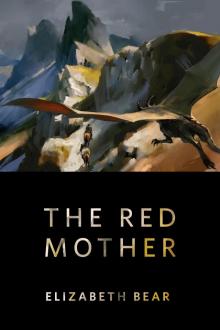 The Red Mother
The Red Mother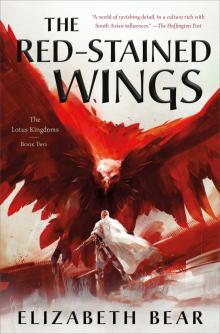 The Red-Stained Wings--The Lotus Kingdoms, Book Two
The Red-Stained Wings--The Lotus Kingdoms, Book Two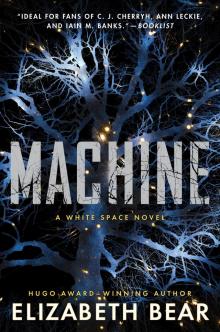 Machine
Machine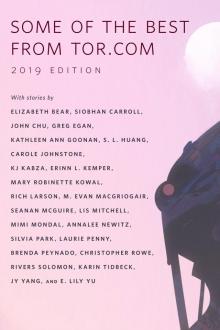 Some of the Best from Tor.com: 2019 Edition
Some of the Best from Tor.com: 2019 Edition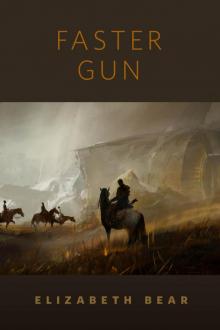 Faster Gun
Faster Gun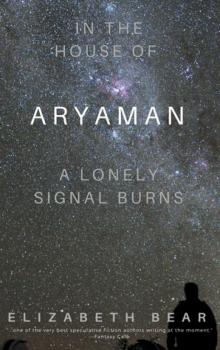 In the House of Aryaman, a Lonely Signal Burns
In the House of Aryaman, a Lonely Signal Burns Stone Mad
Stone Mad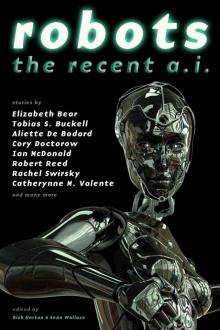 Robots: The Recent A.I.
Robots: The Recent A.I.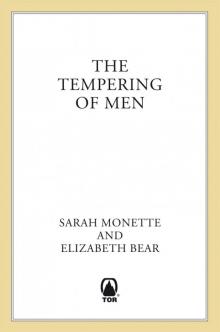 The Tempering of Men
The Tempering of Men Boojum
Boojum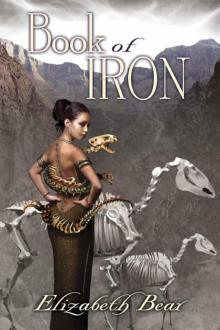 Book of Iron bajc-2
Book of Iron bajc-2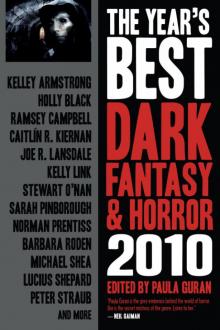 The Year's Best Dark Fantasy and Horror, 2010
The Year's Best Dark Fantasy and Horror, 2010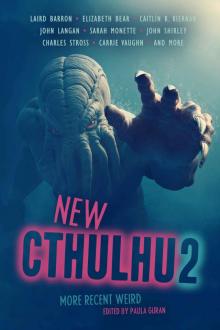 New Cthulhu 2: More Recent Weird
New Cthulhu 2: More Recent Weird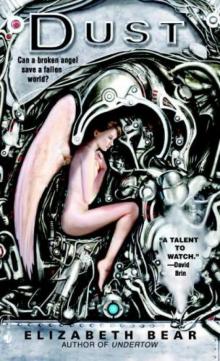 Dust jl-1
Dust jl-1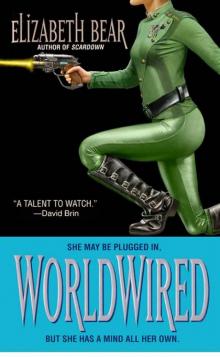 Worldwired jc-3
Worldwired jc-3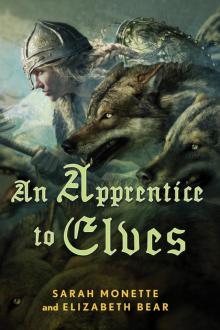 An Apprentice to Elves
An Apprentice to Elves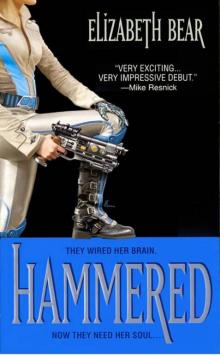 Hammered jc-1
Hammered jc-1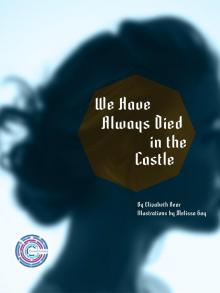 Crowd Futures: We Have Always Died in the Castle
Crowd Futures: We Have Always Died in the Castle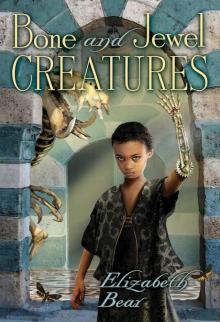 Bone and Jewel Creatures bajc-1
Bone and Jewel Creatures bajc-1 Carnival
Carnival Some of the Best from Tor.com: 2012 Edition: A Tor.Com Original
Some of the Best from Tor.com: 2012 Edition: A Tor.Com Original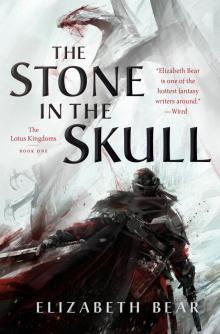 The Stone in the Skull
The Stone in the Skull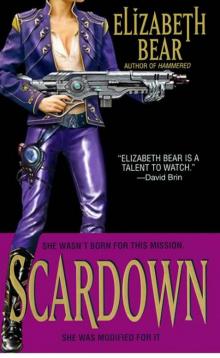 Scardown jc-2
Scardown jc-2 Hell and Earth pa-4
Hell and Earth pa-4 Undertow
Undertow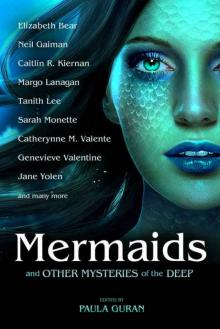 Mermaids and Other Mysteries of the Deep
Mermaids and Other Mysteries of the Deep A Companion to Wolves
A Companion to Wolves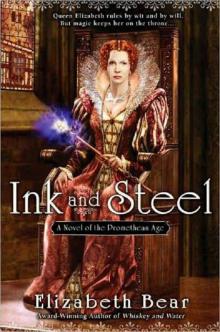 Ink and Steel pa-3
Ink and Steel pa-3